Why AI will be so core to real-world quantum computing

Quantum Computing and Artificial Intelligence (AI) are two of the biggest buzzwords in IT today. Be it large enterprises or small medium-sized businesses (SMB), enabling AI in their workloads and applications today allows them to achieve greater productivity and efficiency. With quantum computing, these organizations are looking to be ahead of their competitors in the race to the future.
Quantum computers can process complex information at a mind-boggling speed and should eventually vastly outperform even the most powerful of today’s conventional computers. This includes the rapid training of machine learning models and the creation of optimized algorithms. Years of analysis can be cut to a short time with an optimized and stable AI that is powered by quantum computing. The combined solution is expected to bring changes to the AI hardware ecosystem.
According to Muni Vinay Kamisetty, the SVP and Regional Head of Data and BI, Enterprise Intelligence at Lazada, different types of quantum computers create a niche landscape of AI hardware. Organizations, large or small can become early adopters to unlock potential efficiencies in their AI operations by integrating quantum computing solutions.
In a report by McKinsey, quantum computers have four fundamental capabilities that differentiate them from today’s classical computers: quantum simulation, in which quantum computers model complex molecules; optimization (that is, solving multivariable problems with unprecedented speed); quantum artificial intelligence (AI), utilizes better algorithms that could transform machine learning across industries as diverse as pharma and automotive; and prime factorization, which could revolutionize encryption.
“Ideally what happens in a deep learning or neural network, we’re passing data into different layers and splitting them. Based on the composition of pixels, we’re teaching them which points are important and not. And the output is understood based on the important points. For example, how we label data for fraud detection. But when you have a million data points, you need a big data architecture to perform the search such as a graph database or machine learning models,” explained Muni.

Organizations, large or small can become early adopters to unlock potential efficiencies in their AI operations by integrating quantum computing solutions. (Photo by ERIC PIERMONT / AFP)
And this is where he suggests using a different approach. Muni pointed out that data can be converted into qubits and the qubits can be used to prepare a quantum data set. Then, a quantum gate is used to evaluate the model and calculate the sample that averages. These averages can be passed to a hybrid model to evaluate the output. This way, the millions of data sets run, deduce, and get trained, before getting synthesized. This basically cuts down all the unnecessary layers in a normal method and only uses one or two layers.
“In AI modeling, it’s called pruning back. So instead of passing full pixels, we’re talking about averages. It will reduce the size of the model. Because it’s a quantum computer, it can also do the pabulum calculations, the training it is required to perform it. Google has recently launched a framework for quantum tensors which uses quantum computing to calculate these models faster.”
Having said that, Muni also pointed out that there are several challenges as to why quantum computing is not easily available to most organizations. The biggest challenge is the sensitivity of the qubit itself. The entanglements between qubits are extremely sensitive that even a slight change in the atmospheric pressure or temperature can break the entanglement. The output will have a lot of noise and will be more of a probability instead of a possibility.
Interestingly though, most of the innovation is happening in dealing with these challenges. Companies like Amazon, Microsoft, Alibaba, and IBM are offering Quantum Computing-as-a-Service (CqaaS). While these are mostly simulators, it allows users to experiment on quantum computing models. It allows users to see how they can apply it to their business.
In fact, IBM believes “frictionless quantum computing” will be a reality by 2025. The firm has taken an initial step towards a vision of creating a programming environment where the “intricacies” of the underlying technology aren’t a concern to developers.
“We’re still not there yet. The ecosystem is evolving. The different type of qubits that are constructive. The noise is still too much. The other problem is how do you connect a quantum computer to a classic computer and present the data. It needs compilers, universal programming language as well as integration to neural networks and converting neural physical data to quantum data,” said Muni.

Companies like Amazon, Microsoft, Alibaba, and IBM are offering Quantum Computing-as-a-Service (CqaaS). (Photo by Josep LAGO / AFP)
Quantum Computing with AI use cases.
As quantum computing can be applied in almost any industry today, some organizations have already begin making use of quantum computing and AI to gain a competitive advantage in their industry.
Giant Wall Street investment bank Goldman Sachs revealed a major quantum computing breakthrough for a financial application, that outperforms the most advanced algorithms of previous generations several months ago. The quantum algorithm can be used on hardware in five years, considerably earlier than expected, to bear on some of the most complex calculations in financial markets.
German car manufacturer BMW is pairing up with Honeywell to figure out how to maximize manufacturing efficiencies with the aid of quantum computing. The auto giant plans to use Honeywell’s machines to find better ways to buy the various parts that make up its cars without disrupting production.
YOU MIGHT LIKE

Increasing global demand for edge analytics
German Chancellor Angela Merkel recently inaugurated the first quantum computer in Germany, built by US firm IBM, hailing it as a milestone at a time of “intense competition” with foreign rivals in harnessing the revolutionary technology. The cutting-edge “Q System One”, located in Ehningen near Stuttgart, is the first of its kind outside the United States and will be operated by Germany’s Fraunhofer research institute.
A quantum computer could also improve AI-based digital assistants with true contextual awareness and the ability to fully understand interactions with the customer — since the former has the potential to sort through a vast number of possibilities within a fraction of a second, and come up with a probable solution.
For now, the power of quantum computing is derived based on entangled qubits. The hardware we currently have still has limitations. While a path to a fully functioning quantum AI ecosystem is still about 10 to 15 years away, businesses can look to invest and experiment on quantum computing for a competitive advantage.








